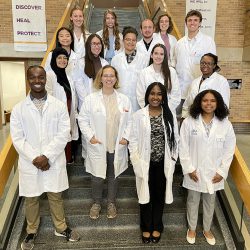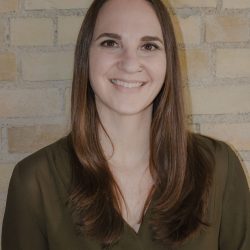First-generation students—those whose parents did not attend higher education—comprise a large share of the community at the Michigan State University College of Veterinary Medicine. Of the doctor of veterinary medicine class of 2025 alone, 41 percent of students are first-generation, and about 130 faculty and staff members were first-generation students. Below, community members share their experiences.
Fiona Yeung, Doctor of Veterinary Medicine Class of 2025

About: “Hello! My name is Fiona Yeung, a Doctor of Veterinary Medicine (DVM) degree candidate for the class of 2025. I am from Mt. Laurel, New Jersey and I attended Rowan University (located in Glassboro, New Jersey) for my undergrad degree. As a future veterinarian I hope to offer various perspectives to animal-based questions with unwavering compassion and knowledge. With the growing awareness of conservation and environmental protection efforts, I want to become a vital source of information to the public and my fellow colleagues; from information on zoonotic diseases, how to coexist with various species, and ways society can improve the quality of life for all things living. My overall goal with pursuing a DVM is to become a voice for the voiceless. I hope to enter into small animal and exotics/wildlife medicine in the future. I am currently the co-president and a co-founder of the College of Veterinary Medicine’s upcoming chapter of Association of Asian Veterinary Medical Professionals (AAVMP). Be on the lookout for our first meeting!”
Thinking back on when you were a first-gen student entering college, what do you know now that you wish you would've known then? “As a first-generation student, I wish I could tell past me that grades and your GPA are not a tell-all on what kind of student you are. I put a lot of pressure on myself to succeed in school and to make myself and my family proud. I wish I knew that I could be less critical of myself, and it reigns true that you are your own worst critic in this case. I also wish that I utilized the resources that were offered for first-gen students, but I was afraid to stand out and face judgement for being a first-gen student. Imposter syndrome runs true through us as veterinary students, but it is also something that first-gen students deeply face. Not knowing if you belong or if you can succeed is a fear that many may have, and it is a natural feeling when facing an unknown, like higher education.”
What do you feel is the biggest misconception about first-generation students? “I feel that the biggest misconception for first-gen students is that there is a lack of academic preparedness. This may come from the idea that without the guidance at home from a parent or guardian that students are not as well-adept for college courses as peers who come from a line of college academics. A person’s background does not necessarily dictate the outcome though. Not having guidance at home for college does not equate to not being successful in higher education.”
What were the advantages of being a first-generation student? “Some advantages to being a first-gen student is coming with stories, skills, and abilities that are uniquely yours. Although there might not be guidance on how to navigate the ways of college life, teachings of working hard and putting in the effort are imbedded into our experiences. Being a first-generation college student in and of itself is a challenge. Being able to break molds and shatter the perspective and stereotypes of what a first-gen student is awe-inspiring. I think that all first-generation students have similar feelings, but their stories are uniquely theirs and that is something that sets us apart.”
Dr. Alba Sanchez Leone, Specialist Teacher-Fixed Term

About: “My name is Alba Sanchez Leone. I am a veterinarian from Colombia. I am a Specialist-Teacher- Fixed Term at the College of Veterinary Medicine at Michigan State University. I completed my DVM degree at Córdoba University in Colombia. I hold a master’s degree from Universidad Nacional Autónoma de México in Mexico and a PhD in orthopedic surgery from Murcia University in Spain.
I love teaching because it gives me the opportunity to impact other people lives. Working at the College allows me to continue improving professionally both as a veterinarian and as a teacher, providing me with additional opportunities to help students succeed in this profession. What I like most working at the College is the great support from colleagues and the administration that help me be great at my job.”
Thinking back on when you were a first-gen student entering college, what do you know now that you wish you would've known then? “I wish I knew the many resources available to me as a first-generation student. I love the resources provided by the College to teach our students.”
What do you feel is the biggest misconception about first-generation students? “I think the biggest misconception about first-generation students is that we enhance the system. We are very resourceful, and we are persistent.”
What were the advantages of being a first-generation student? “The biggest advantage was the support of my parents because they wanted the best for me. They wanted me to be prepared for a better way of life and taught me to never give up on my dreams. My parents gave me the opportunity they never had.”
Paul Edwards, Student Life and Career Services Manager

About: “My position at College is Student Life and Career Services Manager. I am originally from Ferndale, Michigan and have lived in East Lansing/Okemos for 18 years. I went to MSU as an undergrad and graduated with a BA in public administration. I have a law degree from the University of Detroit Mercy, and a master’s degree in Education from the HALE program at MSU.
What I like about my position is the opportunity to work with incredible students and colleagues. I enjoy working with people who share a similar passion for animals. I like to think that I help animals by supporting our College and amazing students.
My first-gen story: I never thought of myself as first-gen until recently, even though neither of my parents went to college. I always thought of first-gen as meaning the first in your family to attend college. This project was enlightening as I learned more about what it means to be first-gen. The reason I didn’t think of myself as first-gen is because even though neither of my parents attended college, I am the youngest of 4 and all 3 of my older siblings attended college, with two of them earning advanced degrees (including a DVM). But my siblings are older, with the closest in age being eight years older, and they were out of the family home during my pre-college and college years. They were available and did provide support, but they were living their lives. My parents were my main support system and while they were tremendously supportive, they did not have the lived experience of attending college to help guide a 17-year-old trying to figure out college on a large campus. I struggled to adjust and got behind from the beginning and it was a challenge to catch up. I did very poorly my first semester and was at risk of being dismissed. So I had to figure it out quickly, which I did and rebounded to eventually be successful. I started college a step behind. As I reflect, I see that being first-gen helped shape me. I had to develop grit and work hard to learn the ropes of what it took to be successful in college. I am proud to be first-gen.”
Thinking back on when you were a first-gen student entering college, what do you know now that you wish you would've known then? “I wish I had more insight into the college experience and what it took to be academically successful.”
What do you feel is the biggest misconception about first-generation students? “That we all fit into a category. First-gen students represent diverse backgrounds and experiences.”
What were the advantages of being a first-generation student? “We have grit, determination, and resiliency.”



